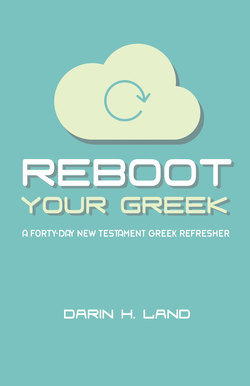Читать книгу Reboot Your Greek - Darin H. Land - Страница 9
На сайте Литреса книга снята с продажи.
Day 4: (Re)building Your Vocabulary
ОглавлениеBuilding your Greek vocabulary is a complex undertaking. Second-language acquisition specialists tend to downplay the value of memorizing vocabulary words. Yet many beginners feel they cannot make any progress in reading the Greek NT until they have at least some basic glosses memorized. It is common for first-year Greek students to be required to memorize words that occur fifty times or more in the New Testament. But of course, unless you were an exceptional student, you didn’t learn all those words with 100 percent recall the first time through. And yet you were able to read many of the sentences, exercises, or verses that you were assigned. You were able to do that by using contextual clues to help you remember the meaning of unknown words.
For these and other reasons, I do not recommend that you spend a lot of time re-memorizing long lists of Greek words and their glosses. Not only does that take a lot of time, it can result in discouragement as progress can seem slow—not to mention that it feels a little bit like punishment for not remembering these words from before.
On the other hand, without having a working knowledge of a critical mass of Greek words, you won’t be able to even get started with reading a Greek sentence. You can’t use contextual clues to help you translate an unknown word if all the other words in the context are also unknown!
So my recommendation for rebuilding your Greek vocabulary is twofold. First, simply read all the words in the dictionary at the back of the Reader’s Edition.7 The words you find there are the ones that occur thirty times or more in the New Testament. Many of these words are the ones you would have been required to memorize for your beginning Greek course. This time, don’t write out vocabulary cards, and don’t memorize the words in the list. Just read the list several times over the next couple days. As you read, you will likely remember some of the words; others will seem to be foreign. No worries. Just aim to feel a little more comfortable with a few more words each time you read through the list.
Second, when reading from the Reader’s Edition for the exercises or for your own bonus time, you will find that words fall into one of three categories: (1) words you already know, (2) words you don’t know but are listed in the footnotes, and (3) words you don’t know but are not listed in the footnotes. Words in the last category are likely common words (more than thirty times in the New Testament), even though you don’t remember them now. These are the words you should look up in the dictionary at the back of the Reader’s Edition. Again, don’t memorize the word. Just note its definition and continue reading. Over time you should find that you have to look up fewer and fewer words in the dictionary.
Exercise 4
Open your Reader’s Edition to John 16. Read as many verses as time allows from this chapter. As you read, do not worry too much about translating what you are reading, just try to recognize as many words as you can. Take a few moments to try to figure out each word before looking it up in the dictionary. But feel free to go to the dictionary as needed. If you can’t quickly find the word in the dictionary, just go on to the next word. Finding words in the dictionary will become easier and easier as we review Greek morphology in the days ahead.8
Reminder: If you committed to spending an extra fifteen minutes per day, be sure to set aside time to do that today, too.
7. If you have chosen to use a Bible software program instead of the Reader’s Edition, you can create your own list of vocabulary words by performing a word search for all words occurring more than thirty times, then having the program list the words and glosses. Check your software’s help files for details on how to do this.
8. Morphology means the study of the various forms Greek words take to convey their function in a sentence. You can find definitions of this and many other important terms in the glossary at the end of this book.
